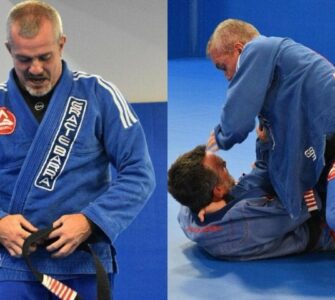If you’ve tried your hand at competing you may have heard that 50% or more of outcome is relating to the psychological struggle. Regardless of how you feel about psychology this is something very worth considering on several levels.
To start with, you may remember when you were starting out jiu-jitsu. Often a move in sparring would surprise you and lead to unanticipated discomfort often producing grunts and random facial expressions that express it. A part of the learning experience is also subverting these experiences and not only knowing what’s coming but being stoic in the face of it.
A lot of the time the struggle is entirely mental. Whether it be persistence while passing guard or holding on a sub it plays a huge part. One thing that I was particularly taken aback with was this concept Ryan Hall describes on his Back Takes DVD – the notion that a choke should always start off slowly ramping up. Not for the actual choke but for the psychological effect.
There’s something to be said about ramping up the pain as opposed to going all out and just hoping to get the tap.
As a female practitioner I often have to utilize this to my advantage – especially so when dealing with beginners. The mental aspect of rolling with a complete beginner (who is bigger than you and also male) highlights the mental toughness to the nth degree. First of all – the first tap is the hardest. This is a blatant depiction of how important mental strength is. As long as they believe you cannot tap them and not experience it themselves they have a certain level of strength and or will to hold on. But once you crack that shell – it’s a whole different game.
Different aspect of this mental toughness is confidence. We’ve all been in bad situations where it seems like there’s no place to go but tap but somehow we weasel out of it. A lot of the time this is happening because of confidence – the dominant opponent is doubting themselves therefore tinkering allowing enough room to escape a certain situation. But this goes both ways as well. Letting doubt seep into your technique can be a crippling experience.
You also have to learn to read the opponent. The sounds, face, breathing – all these small things could make all the difference. Reading about different coping techniques of the inferior bunch you hear all about those who shrug off, complain about a particular injury post tap or give some sort of an excuse.. but all this tom foolery is taking something that’s quite welcome to an unacceptable level. It’s quite allright to be a trickster just as long as you put your technique to work and not your words during or post festum.
Clark Gracie talked about how trickery was the one thing he was missing in his purple belt days:
On how important it is to be sneaky while rolling:
“Yeah being sneaky is, this is something that comes a little bit from parts of Brazilian culture you know which is nothing to do with jiu-jitsu but comes from a word malandragem[in portuguese] and it’s like being strategical being sneaky being a little bit like crafty and I think because it came from Brazil it has that characteristic you know and I remember somebody telling me when I was like a purple belt like Clark’s really good but he needs to work a little bit more the malandragem – “
Malandragem typically translates to trickery. Gracie continued:
“And then I remember that I’m thinking like okay I’m gonna think about that and you know I first something is like, how am I supposed to work that? It’s something that only really comes fromt he time, you know, being sneaky being crafty being like you know setting things up in that way but I know with time it comes you start to feel like oh this position connects to this…”
And this trickery and mental toughness is something you should be actively developing – because it will make all the difference when it comes down to it.

















